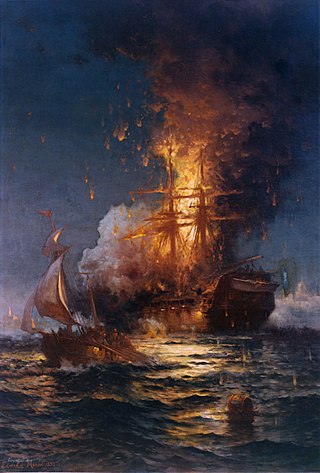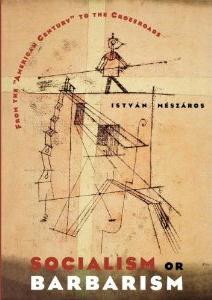
Abracadabra is a magic word, historically used as an incantation on amulets and common today in stage magic.
Ethnology is an academic field that compares and analyzes the characteristics of different peoples and the relationships between them.

A barbarian is someone who is perceived to be either uncivilized or primitive. The designation is usually applied as a generalization based on a popular stereotype; barbarians can be members of any nation judged by some to be less civilized or orderly but may also be part of a certain "primitive" cultural group or social class both within and outside one's own nation. Alternatively, they may instead be admired and romanticised as noble savages. In idiomatic or figurative usage, a "barbarian" may also be an individual reference to a brutal, cruel, warlike, and insensitive person.

The Barbary Wars were a series of two wars fought by the United States, Sweden, and the Kingdom of Sicily against the Barbary states of North Africa in the early 19th century. Sweden had been at war with the Tripolitans since 1800 and was joined by the newly independent US. The First Barbary War extended from 10 May 1801 to 10 June 1805, with the Second Barbary War lasting only three days, ending on 19 June 1815.

Frank Frazetta was an American fantasy and science fiction artist, noted for comic books, paperback book covers, paintings, posters, LP record album covers, and other media. He is often referred to as the "Godfather of fantasy art", and one of the most renowned illustrators of the 20th century. He was also the subject of a 2003 documentary Painting with Fire.

The Barbary pirates, or Barbary corsairs or Ottoman corsairs, were Muslim pirates and privateers who operated from North Africa, based primarily in the ports of Salé, Rabat, Algiers, Tunis and Tripoli. This area was known in Europe as the Barbary Coast, in reference to the Berbers. Their predation extended throughout the Mediterranean, south along West Africa's Atlantic seaboard and into the North Atlantic as far north as Iceland, but they primarily operated in the western Mediterranean. In addition to seizing merchant ships, they engaged in Razzias, raids on European coastal towns and villages, mainly in Italy, France, Spain and Portugal, but also in the British Isles, the Netherlands and Iceland. The main purpose of their attacks was to capture slaves for the Ottoman slave trade as well as the general Arab slavery market in North Africa and the Middle East. Slaves in Barbary could be of many ethnicities, and of many different religions, such as Christian, Jewish, or Muslim.
A barbarism is a nonstandard word, expression or pronunciation in a language, particularly one regarded as an error in morphology, while a solecism is an error in syntax. The label was originally applied to mixing Ancient Greek or Latin with other languages, but expanded to indicate any inappropriate words or expressions in classical studies and eventually to any language considered unpolished or rude. The term is used mainly for the written language.
"The Forgotten War" (capitalized) most often refers to:
Primitive Culture is an 1871 book by Edward Burnett Tylor. In his book, Tylor debates the relationship between "primitive" societies, and "civilized" societies, a key theme in 19th century anthropological literature.
A barbarian is to a person who is perceived to be uncivilized or primitive.
Modern Primitives may refer to:

Socialism or Barbarism is a book about globalism, U.S. socialism and capitalist systems by Hungarian Marxist philosopher and economist István Mészáros. It was published in 2001 and is composed of two parts, the first part is an expanded version of an essay of the same title originally published in 2000; the second part consists of an interview conducted in 1998.
Left in Dark Times: A Stand Against the New Barbarism is a 2008 book by Bernard-Henri Lévy, translated by Benjamin Moser.
A barbarous name is a meaningless or seemingly meaningless word used in magic rituals. The term barbarous comes from the Greek barbaroi meaning those who do not speak the Greek Language (barbarians). Often these names were derived from foreign sources and acquired their "barbarous" nature from the magician's lack of understanding of that language.
Socialism or Barbarism is a 2001 book about globalism, U.S. socialism and capitalist systems by Hungarian Marxist philosopher and economist István Mészáros.
Four Barbarians is the common English translation of the Chinese term sìyí 四夷 for various peoples living outside the borders of ancient China, namely, the Dōngyí東夷 "Eastern Barbarians", Nánmán南蠻 "Southern Barbarians", Xīróng西戎 "Western Barbarians", and Běidí北狄 "Northern Barbarians". Ultimately, the four barbarian groups were either partly assimilated through Sinicization and absorbed into the Chinese Civilization in the later Chinese Dynasties or emigrated away from the Chinese heartland.
This page is based on this
Wikipedia article Text is available under the
CC BY-SA 4.0 license; additional terms may apply.
Images, videos and audio are available under their respective licenses.





